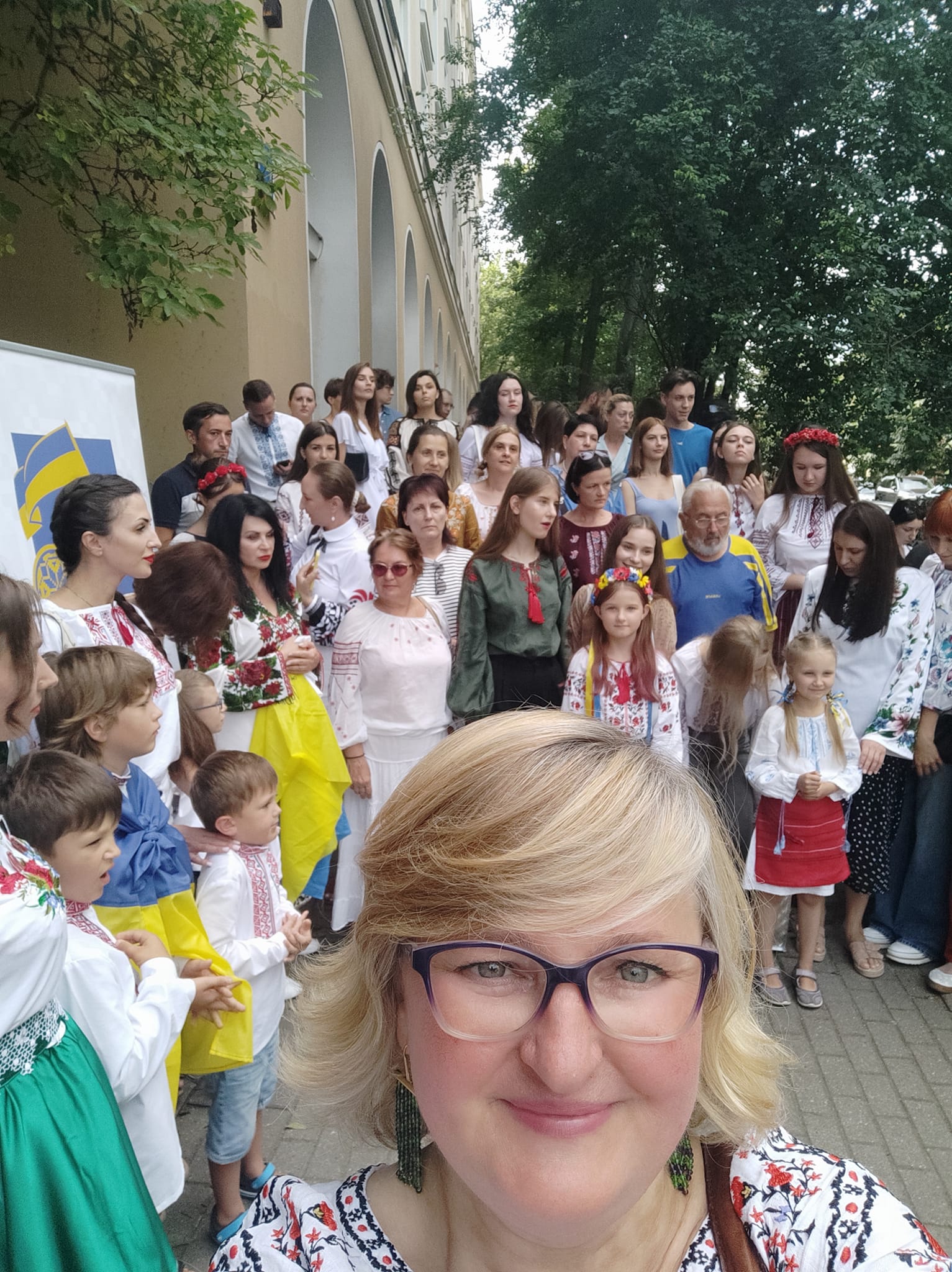Myroslava Keryk
President, Ukraiński Dom
Fellow project website: www.naszwybor.org.pl
Migration and exile deprive people of agency. Myra Keryk is transforming the experience of migrant workers and refugees in Poland by quickly enabling them to become active contributors to the common good and by building broad-ranging relationships and social cohesion, especially between Ukrainians and Poles. In the process she is helping Poland own a new identity as a multi-ethnic nation.
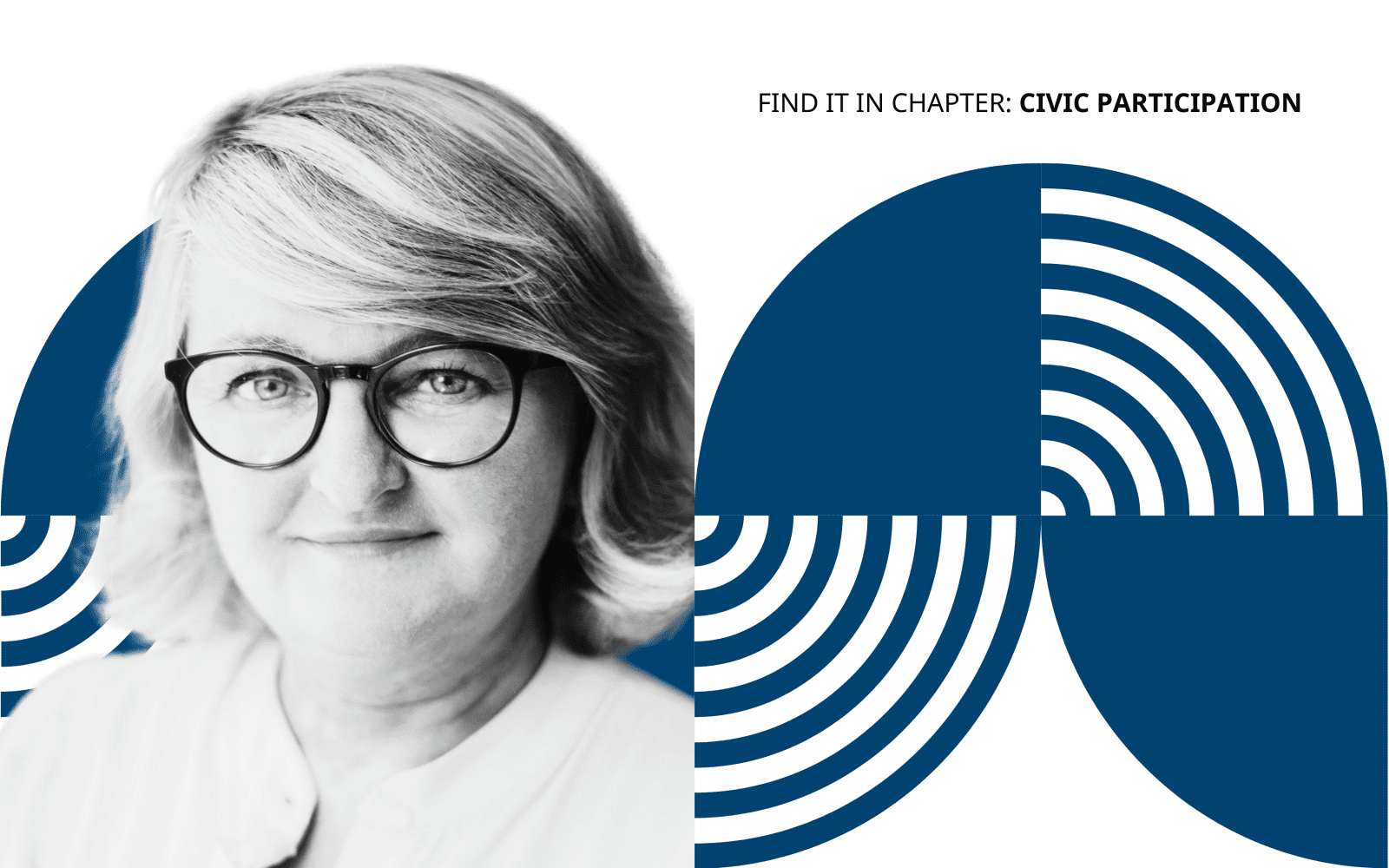
THE NEW IDEA
Through her Ukrainian House Foundation, Myroslava Keryk is both helping (1) Ukrainian refugees and migrant laborers find work and broad engagement in Poland, and (2) helping host communities understand and value their new neighbors. The work aims to reduce prejudice and prevent conflict in a country where fast-growing Ukrainian migration is both challenging deeply held beliefs and attitudes and also dramatically swelling the population of some Polish cities. The sudden necessity of “cohabitation” has created space for polarization and even radicalization among both Ukrainians and Poles. Ukrainian House Foundation is actively building new relationships, policies and understanding across both groups, steering system-wide change across Polish society and workplaces.
To address the needs of both “people on the move,” as Myra refers to migrants and refugees, and their new host communities, Ukrainian House Foundation provides both short-term direct support and deeper, long-term programs to build connection, resilience and integration. The Foundation gathers data and publishes its findings to inform policymakers and employers about the realities of a new, multi-ethnic Poland. Indeed, its comprehensive survey of the impact of Covid on thousands of Ukrainian domestic workers has already influenced one systemic change: It was credited by Polish activists as helping them successfully organize a domestic workers union – the first of its kind in Poland.
The Foundation’s work has become urgent since Russia’s 2022 full-scale invasion of Ukraine, which sent six million Ukrainians across the border into Poland in a few short months. While many have moved on, some 1.5 million of those have settled there, a fact that upsets one in three Poles. Ukrainians now make up almost 9% of Poland’s population, and some Polish cities have seen between 15 and 50 percent population growth in the past 18 months.
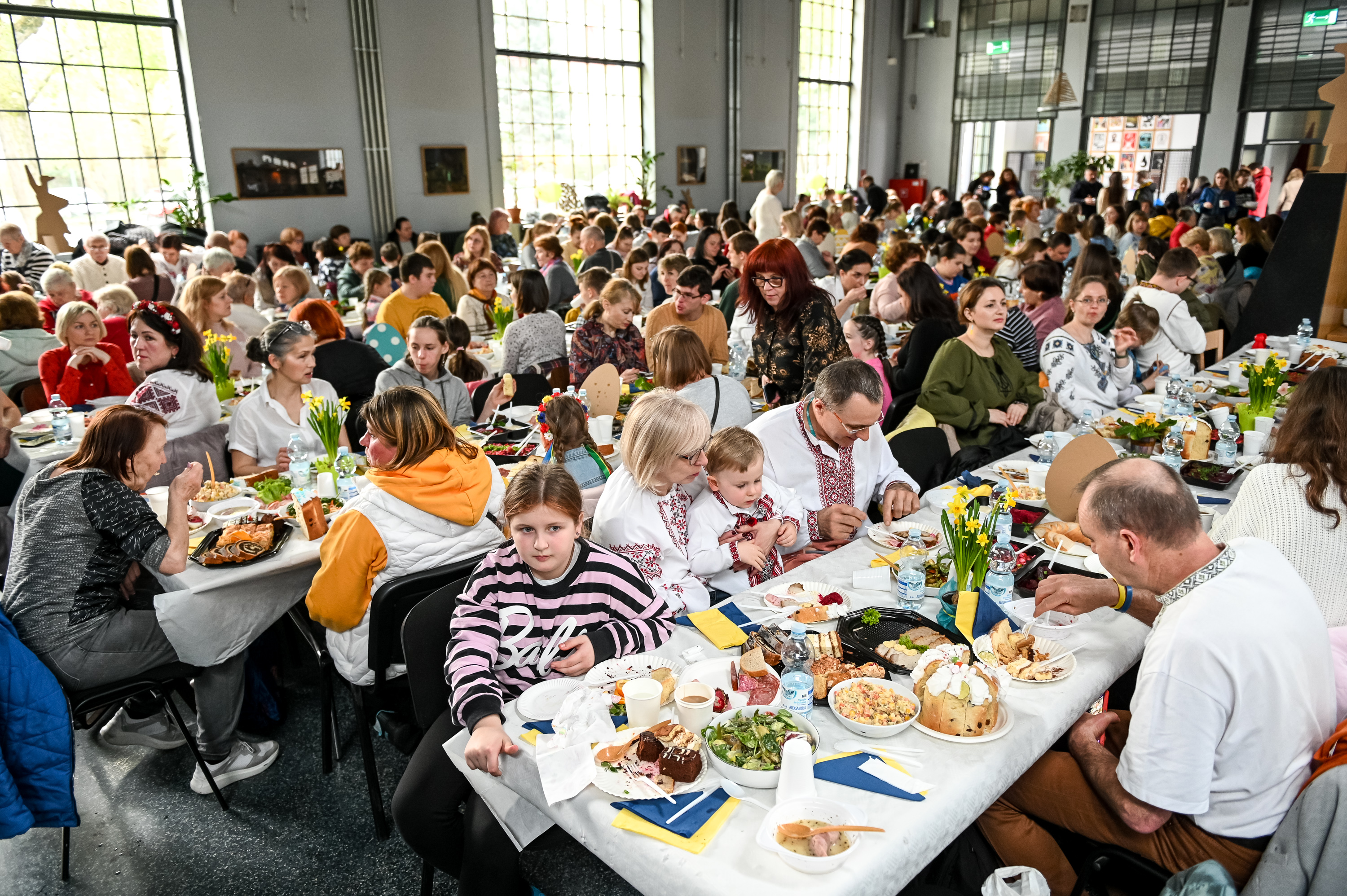
In the immediate aftermath of the invasion, Ukrainian House rapidly scaled its services to meet the crisis. In a few short months it tapped business and community partnerships to provide housing for more than 80,000 Ukrainians; organized legal and social guidance for some 60,000 adults and stood up a children’s school staffed with Ukrainian teachers. In total, the organization helped more than 100,000 people directly during the 16 months after the full-scale invasion by Russia.
Consistent with its long-term focus, Ukrainian House sees the newly arrived Ukrainians as contributors and peers. It organizes carefully designed discussions and activities that make this in fact happen. Its programs are anchored by a series of guided discussions. It gets the new arrivals and long-rooted Poles to discuss migration and integration directly.
In addition to wrestling with issues of cultural identity and belonging, Ukrainian House actively shapes cultural and social life in Warsaw and 15 smaller municipalities.
This work includes holding joint cultural and educational programs that highlight shared and distinct national histories, women’s clubs, choirs, libraries, reading groups, conferences, and theater participation. The group also provides activities held at the resource centers and gathering spots for new arrivals across the country. Myra has multiplied such physical centers by drawing in the concept of Ukraine House as a physical gathering place is currently scaled through 60 CSOs in the Mazovia Region (roughly between Lodz and Bialystok) and around Gdansk. Five more centers will open in the next few months. All Myra’s Ukrainian-focused undertakings are paired with local Polish organizations and administrations.
As a Ukrainian native who came to Warsaw for PhD studies two decades ago, Myra recognized the growing need for a broad redefinition of the idea of “migrant integration.” Along with a consortium of aligned CSOs, Ukrainian House and Myra co-created draft legislation for a National Migration Policy, a framework which has never before existed in Poland. Here again, she takes the long view. How Ukrainian immigrants and their hosts integrate will define the pattern long-term. Myra’s goal is to make Poland a model for all Central and Eastern Europe as it too also experiences rapid social change.
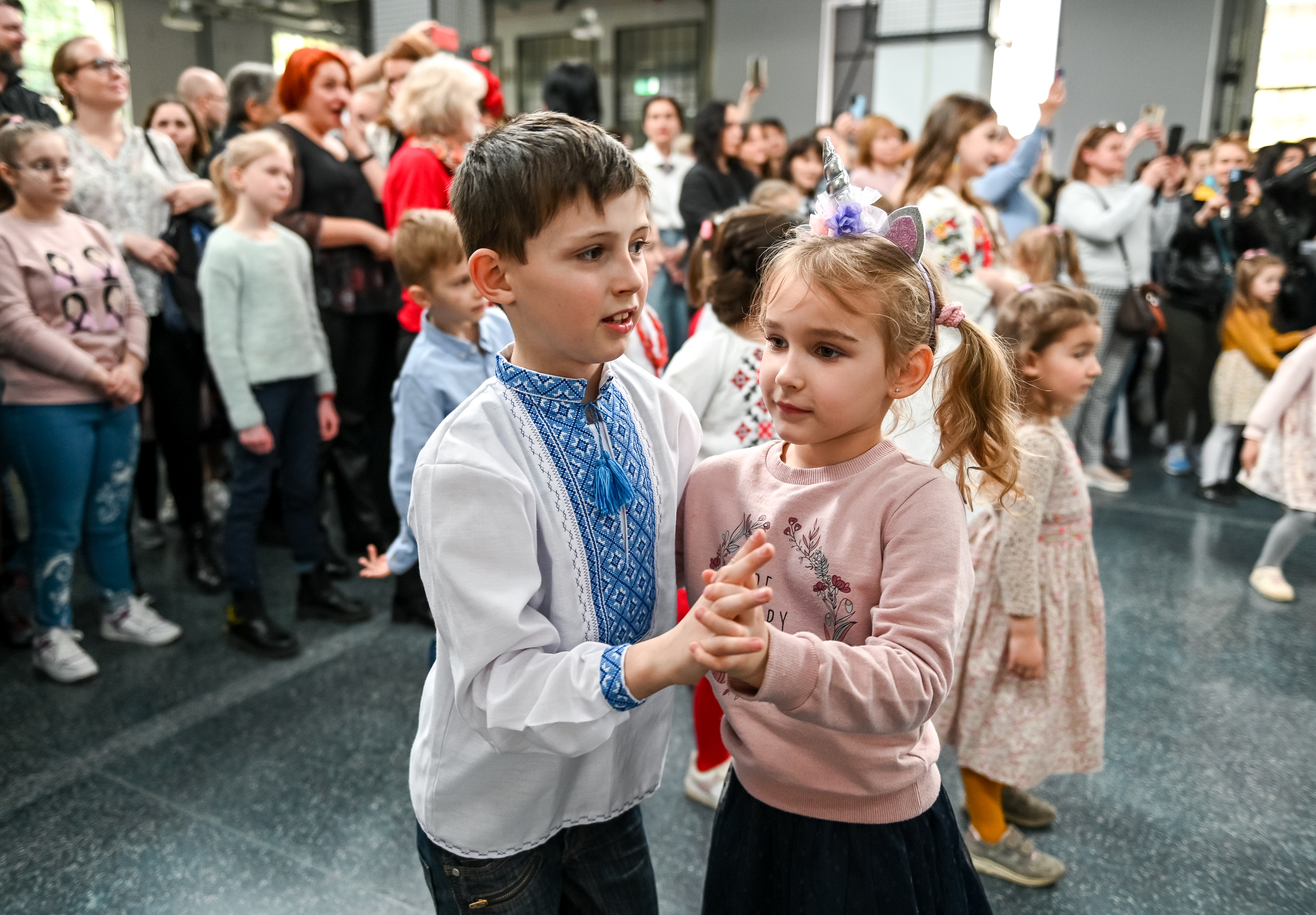
To this end Myra is an ongoing advisor to Polish authorities on migration policy and regularly presents her findings at European economic and security gatherings. She has become a respected voice on issues of migration and integration and has received numerous regional and national awards for integrating immigrants and improving Polish-Ukrainian dialogue. Indeed, she is now being nominated as “Varsovian of the Year” -- a singular distinction for a non-Pole.
Through her work Myra hopes to ensure that on a future Polish Independence Day, Poles and people from other nations will march together with Polish and other national flags celebrating freedom and democracy for all.
THE PROBLEM
Large-scale migration to Poland is very new. After World War II and under communism, Poland became a strongly monoethnic country, and Polish identity was built on that homogeneity. Among European countries, Poland has had one of the lowest percentages of ethnic minorities -- as little as 3% of its population.
The homogenization of Poland resulted from an active effort by the Communist regime to build a unified national identity, a process known as ‘Polonization’. Although Poland is politically safer than it has been in centuries, with stable borders and democratic, this framework loves on, perpetuated by media and politicians that forge perceptions of threats to Polish culture and sovereignty.
"A year ago, after the start of the Russian invasion of Ukraine, the Ukrainian House turned into a crisis response center with a hotline for Ukrainians arriving in Poland, information about changing conditions and procedures at the border, assistance in finding accommodation, coordination of volunteers and psychological support for refugees.”
-Polityka
Studies show that immigration from Ukraine to Poland in the past decade has started to have significant economic, social, and political consequences. From 2013 to 2018, the number of Ukrainian migrants to Poland grew dramatically across categories – largely seasonal workers but also work and residence permit holders, students, and others. This growth is transforming the role played by migrants in the Polish labor market. Public opinion polls in Poland show that Poles are apprehensive about Ukrainians, which changed for a moment after the full-scale Russian invasion in February 2022.
Russia’s assault sent millions of Ukrainians across the border into Poland. The scale of the influx is daunting: Rzeszów, the largest city in southeastern Poland, has seen its population jump by 50%. In Warsaw, the population has grown by 15%, while Kraków’s has risen by nearly a quarter and Gdansk’s by more than a third.
At first Polish society and international humanitarian organizations mobilized to help with the urgent need for housing, income, and schooling. Polish authorities were also supportive initially, introducing special benefits such as payments to host households and free public transport. But these measures were withdrawn in June 2022, and by early 2023 Poland’s Deputy Interior Minister announced that free shelters would no longer be available because “we are convinced that many people in Poland can become independent and adapt.” Influenced by politicians’ narratives, Poles are becoming less friendly towards refugees and migrants from Ukraine.
As the war has dragged on, the Ukrainians’ continued presence, and the prospect of their remaining permanently, is raising tensions. One third of Poles are unhappy with the idea of Ukrainian citizens staying “for a longer period,” as the Polish government has offered. The sudden experience of migration for Ukrainians, and for Poles, having to live side by side with large numbers of newcomers, has created space for polarization and even radicalization in both groups.
"Filled with sadness and hopes of a victorious 2023, hundreds of Ukrainian refugees celebrated their first Christmas since fleeing the Russian invasion at a contemporary theatre in Warsaw organized by the Ukraine House.”
-France24
THE STRATEGY
Myra understands that the experience of people on the move can only change with a transformation of the welcoming society. Myra’s strategy involves discussions and actions designed to effect systemic change in the mindsets of both groups, both where they live and work.
At its most fundamental, Ukrainian House poses a series of questions to both newcomers and Poles for conversation and reflection. These questions are woven through the many activities the Foundation supports, and across the time period in which migrants are adapting to their new lives.
First comes “Where am I? We are here.” The next step asks: “What can we do?” And finally, “Who am I? Who are we?”
As Ukrainians find themselves in a new reality after arriving in Poland, they ask themselves: Where am I? The Foundation supports them in finding the answer, first, through a consultation service that helps them navigate settling in, from working through complex legal issues to locating psychological and social support.
The needs of arriving Ukrainians became urgent in the immediate days after Russia’s invasion in late February 2022. Ukrainian House pivoted quickly to respond. It partnered with AirBnB and Polish real estate investors to find housing for 80,000 individuals; tapped 8,830 homes offered by Polish citizens to share and proudly adds that it also found housing for 1,220 dogs, five snails and two tarantulas. With an average accommodation of over a month, Ukrainian House beneficiaries have been hosted over 500,000 days -- almost 1,370 years.
Additionally, from late February to late March, Ukrainian House staff helped with 60,000 cases by phone and over 16,000 consultations in person, expanding its staff tenfold to address urgent need.
On the welcoming side, Polish society benefits from Myra’s support in understanding that We are here, in the local community, in the labor market, and in neighborhoods where Poles and Ukrainians live together. At the national level Ukrainian House uses data from its programs to brief Polish leaders with research and publications documenting, among other things, labor violations and the impact of Covid-19 on Ukrainian migrant women. These form a basis for conversation with employers and decision makers. Its report on women workers during Covid is credited by Polish activists with successfully bringing about the creation of a Domestic Workers Union, the first of its kind in Poland. Besides providing direct support to domestic workers, the union works for legislative changes in this still-unregulated market.
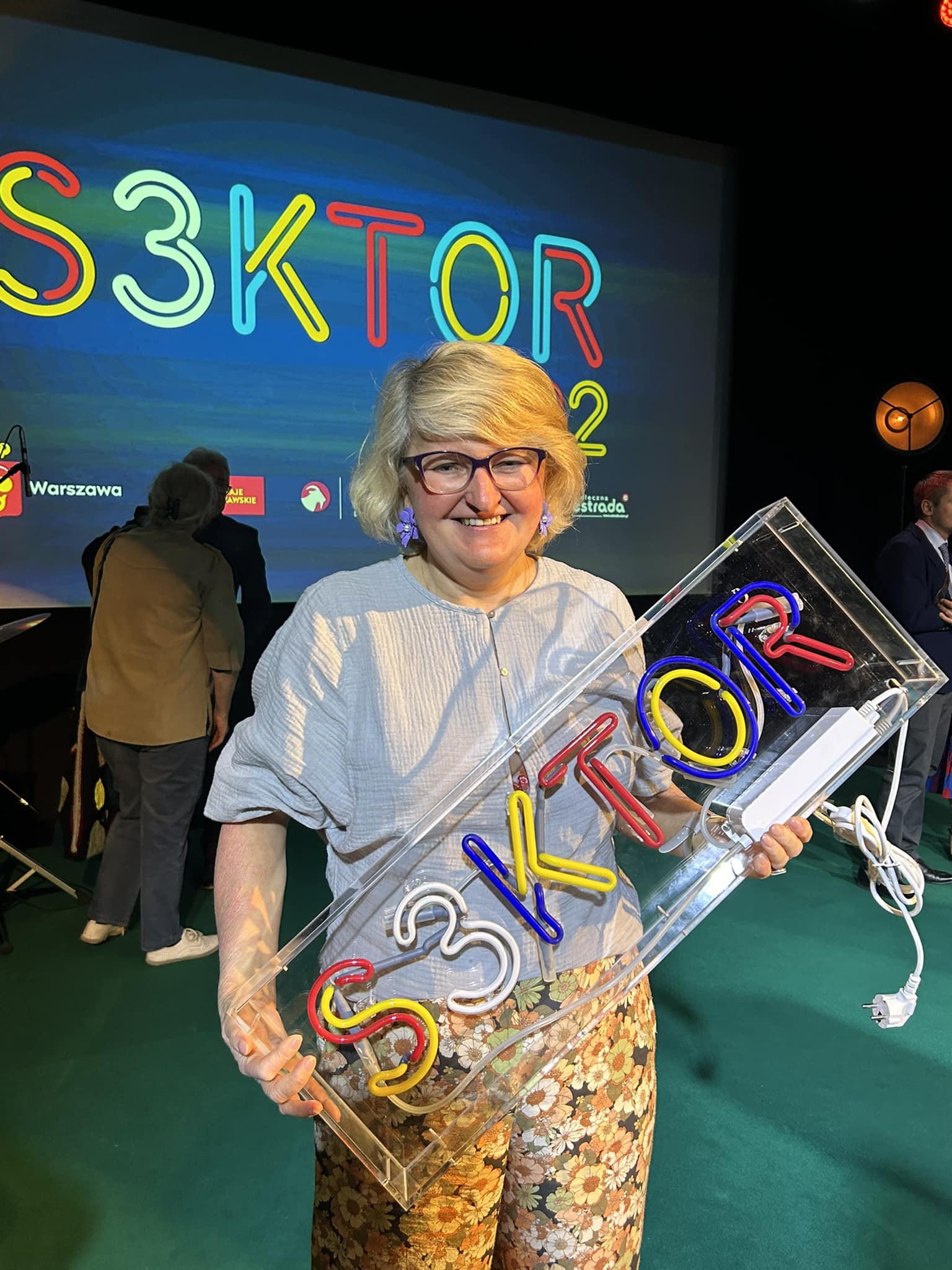
The second question Myra asks (and helps Ukrainians and Poles answer) is “What can we do?” to find and create opportunities for active participation by both groups. Jobs are critical for labor migrants and refugees. Ukrainian House established a work department in the second half of 2022, consulting directly on jobs and work-related challenges. It holds weekly open office hours and provides legal support, tax advice, information on the market and other topics. Its team runs a news portal with articles about Polish society and work culture, and specific materials about the rights of employees and fair wages. It has also initiated a program for I-T job training with a corporate partner.
While adults need to work, children need to go to school. Due to the urgent need for refugee children to complete the school year in Warsaw, Myra partnered with an experienced Polish CSO to open the Warsawian Ukrainian School, following the guidelines of Ukraine’s Ministry of Education and Science. In 25 days, Ukrainian House was able to stand up an entire school for multiple grades, staffed with Ukrainian teachers.
Besides work and education, Myra recognizes that Ukrainians need to feel at home in Poland. Myra and the Foundation developed the format for a community center called “Ukraine House,” a physical space where everyone is welcome, and a cup of warm tea is offered. These houses offer activities like choirs, reading groups, exhibitions, and volunteering opportunities. The Warsaw location alone offers some 300 gatherings a year. Ukraine House helps speed up a change of perception for a new person in a new community – from being a newcomer to being a member. These houses organize most events in both Ukrainian and Polish, and they model cooperation between the communities.
Myra multiplies this bridge-building work through many collaborations with Polish civil society. Examples include partnering with the Polin Museum (Museum of the History of Polish Jews) and Malta Festival Poznan, a theater festival, to offer courses and discussions about the diverse socio-cultural context of the region.
Myra’s many collaborations have helped her build a consortium of Polish CSOs to co-create national migration policy. She is part of working groups on migration policy in Warsaw and nationally. She has also helped establish a coalition of minority organizations, beyond Ukrainians, to train community organizers, minorities, and migrants. Novice leaders can implement their ideas as part of an incubator of migrant and minority initiatives, multiplying the impact of Myra’s work in new communities.
The third question, Who am I? addresses the challenges migration creates for personal identity. Informal contacts with Ukrainians and Poles aim to shift one identity -- Ukrainian -- toward a new one of “being both” -- Ukrainian in Poland, getting the best of both sides. Ukrainian House helps to define this new identity, by helping embed Ukrainians in a local context, working together with Poles. As women make up a significant proportion of migrants, Myra established the Ukrainian Women’s Clubs as a space of exchange and free expression. The first groups consisted mainly of cleaning ladies, who needed a space to express themselves as women, beyond their roles at work. There, they share their talents, hobbies, as well as troubles and challenges. In 2022 there were already six Ukrainian Women’s Clubs.
Finally, the Who are we? question calls on both Poles and Ukrainians to embrace the new reality of a multiethnic Poland. This entails building at both the individual and national levels. Ukrainian House discussions, meetings and activities highlight the shared and distinct histories of both Ukrainians and Poles, and in joint activities each group can accompany the other in asking who they are and searching for answers together.
Through her many organizations and allies and her own presence in public discourse and media in Poland and Europe-wide, Myra is seeding this idea.
It’s powerful. It fights destructive division. And it helps everyone -- everyone from all groups -- live in a bigger world, a world that invites all to do more. This is what the world, not just Poland and Central Europe, needs.
THE PERSON
Myra was born in the Soviet Union and grew up in a village 30 kilometers from Lviv, about an hour and a half drive from the Polish border. Social commitment and Ukrainian-ness were strongly present in her home and shaped her upbringing. Her father’s family founded “Prosvita” (Ukrainian: просвіта, ‘enlightenment’), a meeting place for cultivating Ukrainian identity and culture, and for learning to read. The group operated in her father’s family home. For leading this initiative, her grandparents, father, and uncles were punished with exile to Siberia. Myra’s dad would not return for ten years.
For this reason, the headmistress of Myra’s school, a true Communist, deeply disliked Myra’s family. Teachers treated Myra harshly, and, because of a skin condition, children also bullied her. Despite the difficulties, Myra joined the Pioneers (Soviet scouts), where she organized joint cleaning of houses and farms for the oldest inhabitants of their villages.
Myra’s mother encouraged her to continue her studies, believing she would not find a husband due to her skin disease. (She was wrong!) After studying history at a university in Lviv, Myra continued her education at the Central European University in Budapest until she moved to Warsaw for doctoral studies.
In 2004 a revolution broke out in Ukraine after rigged presidential elections. Myra joined in demonstrations and began to act in Poland, with both Ukrainians and friends from the university. When the protests died down, Myra decided to deepen her work to continue creating a positive impact for Ukrainians and other people on the move, first as an informal group and later as Ukrainian House Foundation. Myra has committed full-time to building common ground for Poles and Ukrainians, sharing past, present, and future.
